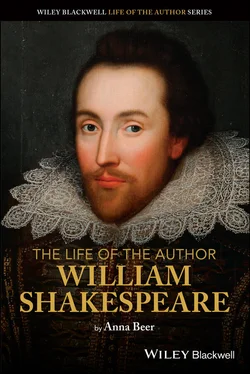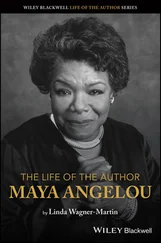Married at 18, and to an older woman. A father of three children before he was 21. We might think these are crucial events in the formation of William Shakespeare, the man. Yet Alan Stewart (2016, p. 38) has demonstrated how thoroughly the “marriage was effaced by Shakespeare’s seventeenth century ‘biographers’ who constructed for him not a familial but a theatrical dynasty” (Traub 2016, p. 38). These earliest accounts of Shakespeare’s life are almost completely silent about family – and more specifically, silent about women. “Aubrey gives us a father, but only as the representation of a trade that Shakespeare rejects; and there are no women, except an unnamed sister” (Stewart 2016, p. 68). This is normal for seventeenth-century life-writing, so it should not be surprising that only in 1693 is Shakespeare represented as married. Twentieth-century literary critics are, ironically, equally unwilling to consider Shakespeare the married man, not because of a lack of interest in these trivial, domestic (feminine) matters but because of a distrust of the biographical turn. Marjorie Garber (2004, p. 20), for example, is typical in her pronouncement that there has been much “speculation” about William’s marriage to Anne. She does not mention the matter again.
Dismissing talk of marriage at least avoids the at times unedifying biographical feeding frenzy that surrounds William and Anne Shakespeare’s marriage when it is considered. Part of the problem is that the biographers are feeding on nothing. There is no direct evidence to show how William felt about Anne, or vice versa. And nature and biographers abhor a vacuum.
That there were no more children born to Anne and William after the twins prompts the normally cautious Lois Potter (2012, p. 59) to wild speculation, an “if” leading to a “might”: “If Shakespeare did indeed have Catholic sympathies, he might have been unable to envisage any way except separation to avoid having more children.” Potter is determined to discredit an alternative interpretation – that William was repelled by sex with women and the resultant babies. We will return to Shakespeare’s sex life later.
For others, the vacuum itself is viewed as telling. The “supremely eloquent” Shakespeare does not write anything to or about Anne, no “signs of shared joy or grief, no words of advice,” not even any financial transactions (Greenblatt 2004, p. 125). This proves that William “could not find what he craved, emotionally or sexually, within his marriage.” Assuming the Shakespeare family’s Catholicism, and that William’s earliest sexual experiences would have been with other boys at school, Greenblatt goes on to try to work out why Will would have found Anne attractive. She is different: Protestant to his Catholic, straight to his queer. Anne (Greenblatt 2004, p. 119) represents an antidote, “a reassuringly conventional resolution to his sexual ambivalence and perplexity.” And because the great writer is so complicated, tortured, and bisexual it can’t possibly last. In this scenario, William becomes a “reluctant, perhaps highly reluctant” bridegroom (Greenblatt 2004, p. 123), trapped in a marriage that he cannot escape.
It’s an old, old story, as Lena Cowen Orlin (2016, p. 42) points out in her reassessment of the evidence. “By the early nineteenth century, the narrative of Shakespeare’s relationship with Anne Hathaway was fixed: the eighteen-year-old William was trapped by the pregnancy of a twenty-six-year-old into a marriage that he fled as soon as possible, years later confirming his disaffection for his enforced wife in the derisory dying bequest of a second-best bed.”
The marriage is, however, a blessing in disguise, because these nuptial disappointments prompted Shakespeare’s migration to London. Shakespeare, in other words, needed to cast off an unfortunate marriage in order to realize his destiny.
Archeological evidence (Scheil 2015) discovered in William and Anne’s marital home, New Place in Stratford, suggests a different picture. Anne Shakespeare ran a large and wealthy household. In the absence of any evidence of abandonment, let alone complaint from Anne regarding support, perhaps we should see her as the trusted partner in the marriage, the one keeping the home fires burning. Equally, that the Shakespeares had three children, then no more is not necessarily a sign that they were no longer sexually active. Miscarriages and stillbirths were distressingly common and most were unrecorded. What is more, Shakespeare remained involved in Stratford life as a family man and landowner during the years in which he achieved success on the London stage.
Even those biographers who do not see the marriage as an active evil nevertheless view Shakespeare escaping pleasant but provincial Stratford and seeking his fortune in dangerous but exciting London. This too may be based on a false premise, that somehow Stratford was a rural, pastoral idyll in comparison to the dirty, gritty capital. Nowhere was safe from the everyday catastrophes of life in late sixteenth-century England, whether political and religious regime change, fire, plague, and poor harvests, or infant (and maternal) mortality. Like all his contemporaries, Shakespeare was engaged with a complex web of loyalties grounded in the household or extended family, the sprawling social unit that characterized late Elizabethan life, but this did not mean that Warwickshire and London represented two entirely separate existences. Gilbert, William’s closest brother in age, would act as his agent in Stratford during his frequent absences in London, whilst William would look out for his much younger brother Edmund in London (Richardson 2015). 7Moreover, one’s immediate family was important but not exclusively so. Other networks could be, and would be, just as important to William Shakespeare, not least those of the theater world.
For it is as an actor in London that William next appears in the archive, but only in 1592. After the christening of Hamnet and Judith, seven long years pass before their father’s name appears again in any document. Most assume he had been in the city for some time before 1592. Park Honan has Shakespeare settled in London by 1589 or 1590 at the latest, living in Shoreditch, and remaining there during some of his apprentice days in the theater, close to his fellow playwright (and exact contemporary) Christopher Marlowe. Honan vividly evokes the streets of Shoreditch – until 1588 also Richard Tarlton’s home turf – with its “jutting, far-overhanging storeys of shops” which “often broke off the sunlight so that, on a good day, the lanes were in shadow” (2005, p. 186). 8
There’s a gap to be filled between Shakespeare’s christening in Holy Trinity Church, Stratford, and the seedy streets of Shoreditch, and biographers duly fill it. The goal is to get William to the big city and many and various are the routes by which he arrives.
One story goes that the return of the Queen’s Men to Stratford-upon-Avon in 1589 changed the course of Shakespeare’s life. The company were a man down after an unfortunate incident in Thame, Oxfordshire: their leading actor was killed in a street fight. Perhaps the 23-year-old William stepped in to fill the gap? It’s a nice idea, but implausible, not least because he would have had to have been remarkably impressive to take over a leading role.
More plausible is seeing young Will as a strategic rather than reluctant bridegroom. “Let us suppose that Shakespeare did not want to spend his life – or any more months than he already had done – as a Stratford artificer. The wedding would have been a means of escaping the life that had been organized for him”: Orlin (2016, p. 56) argues that this “new way to cluster the evidence” suggests that William’s marriage “may have been not one from which Shakespeare had to break free but instead the means by which he was able to break free.” The marriage remains a significant factor pushing him to London, his goal to support (not escape) his young family. Rather than a delusional act of self-destruction built on a fantasy from which Will had to escape as soon as possible, the marriage might have been a thoroughly sensible decision for an aspiring actor, intrinsic to his future success rather than an impediment to it.
Читать дальше











![Уильям Шекспир - The Works of William Shakespeare [Cambridge Edition] [Vol. 1 of 9]](/books/746589/uilyam-shekspir-the-works-of-william-shakespeare-c-thumb.webp)